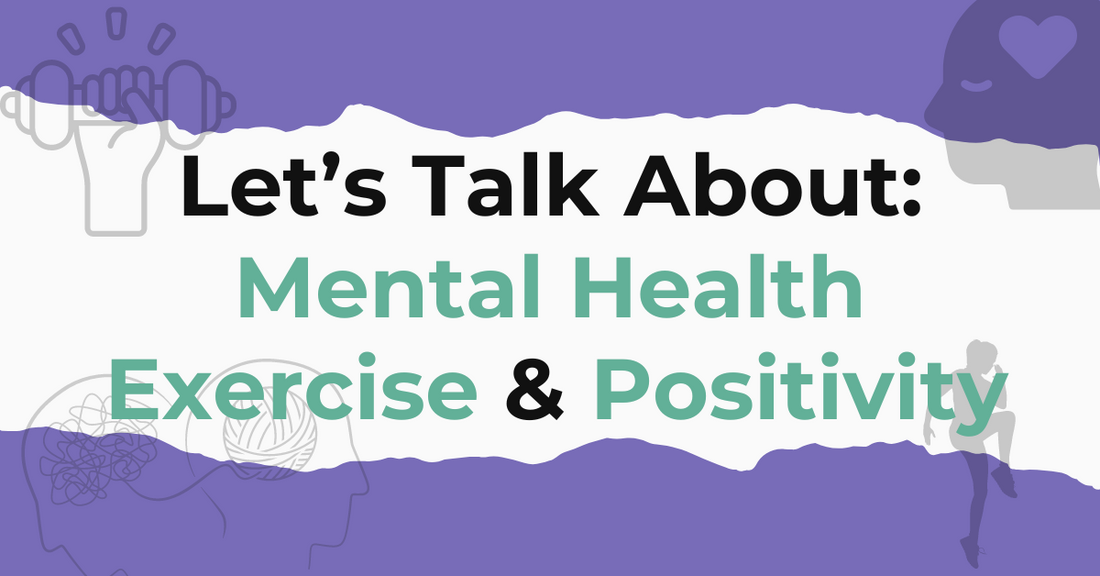
Positive Mental Health Impacts of Exercise
Share
Beyond the Physical: The Overlooked Mental Health Benefits of Exercise
When people consider exercise, they typically think about physical benefits, losing weight, building muscle, or improving heart health. However, the mental health benefits of exercise are equally significant and often overlooked. As a qualified mental health and exercise coach, I work closely with my clients to emphasise both physical health and mental well-being. Over time, I’ve observed profound positive impacts on my clients’ mental health, whether they’re engaging in weightlifting, cardio, yoga, or group activities. Exercise is not just a tool for physical transformation; it’s a powerful mechanism for enhancing mental well-being.
The Role of Weightlifting in Enhancing Mental Health
Building Strength, Building Confidence: The Mental Benefits of Weightlifting
Weightlifting is not just about building muscles, it’s about mental resilience and boosting confidence. The discipline, focus, and effort required in weightlifting translate into significant mental health benefits.
- Stress Relief: The physical exertion of lifting weights helps reduce stress by releasing built-up tension and energy. This is particularly beneficial in managing daily stressors.
- Improved Focus: Weightlifting demands intense concentration, allowing individuals to block out negative thoughts and focus solely on their physical performance.
Unique Insights:
- Cortisol Reduction: Regular weightlifting can lower cortisol levels, the hormone associated with stress, leading to a calmer, more balanced state of mind.
- Neurogenesis: Engaging in weightlifting may promote neurogenesis, the growth of new brain cells, which can enhance cognitive function and mental clarity.
Self-Esteem and Empowerment
Weightlifting can significantly boost self-esteem. As individuals see improvements in their strength and physical appearance, they often experience a heightened sense of self-worth.
- Physical Progress: The visible gains in strength and muscle tone can lead to a more positive self-image.
- Achievement: Setting and achieving personal records in weightlifting fosters a strong sense of accomplishment and empowerment.
Unique Insights:
- Body Image: Weightlifting can improve body image perception, leading to greater confidence and self-acceptance.
- Resilience: Overcoming the physical challenges in weightlifting builds mental resilience, which can be applied to other areas of life.
Cardio Exercise: Boosting Mood and Reducing Anxiety
Running Towards Happiness: How Cardio Supports Mental Well-Being
Cardiovascular exercise, or 'cardio', is well-known for its physical benefits, but its impact on mental health is just as important. Activities like running, cycling, skipping, or swimming can profoundly enhance mental well-being.
- Endorphin Release: Cardio triggers the release of endorphins, the body’s natural mood enhancers, leading to what’s commonly known as a “runner's high.”
- Anxiety Reduction: The repetitive nature of cardio exercises can be meditative, helping to calm the mind and reduce anxiety.
Unique Insights:
- Serotonin Boost: Regular cardio can increase serotonin levels, which helps regulate mood and combat depression.
- Cognitive Function: Cardio enhances blood flow to the brain, improving cognitive function and memory.
The Power of Routine and Structure
Establishing a regular cardio routine can bring structure to your life, which is beneficial for maintaining positive mental health.
- Consistency: Regular cardio helps instil a sense of discipline and routine, which can be particularly grounding for those struggling with anxiety or depression.
- Stress Management: The routine aspect of cardio exercise provides a structured outlet for managing stress and emotional turbulence.
Unique Insights:
- Sleep Improvement: Consistent cardio can improve sleep quality, which is crucial for mental health and overall well-being.
- Long-Term Mood Stability: Regular cardio has been linked to long-term improvements in mood, helping to stabilise emotions over time.
The Calming Influence of Yoga on Mental Health
Finding Peace on the Mat: Yoga for Mental Clarity and Calm
Yoga is widely recognised for its physical benefits, such as increased flexibility and strength, but it also offers profound mental health advantages. The physical postures, breath control, and meditation make yoga an exceptional practice for mental clarity and calm.
- Mindfulness: Yoga emphasises mindfulness, staying present and focusing on the breath, which helps reduce stress and anxiety.
- Emotional Stability: The meditative aspects of yoga help individuals process emotions, leading to greater emotional balance and resilience.
Unique Insights:
- Parasympathetic Activation: Yoga activates the parasympathetic nervous system, which promotes relaxation and counters the stress response.
- Trauma Release: Certain yoga practices are designed to help release trauma stored in the body, offering a therapeutic approach to mental health.
Connecting Mind and Body
The connection between mind and body is a central theme in yoga, and is crucial for overall mental well-being.
- Awareness: Yoga enhances body awareness, helping individuals tune into their physical and mental states.
- Balance: The practice fosters a sense of balance between mind and body, which is essential for holistic health.
Unique Insights:
- Breath Control: Pranayama, the practice of controlled breathing in yoga, can significantly reduce symptoms of anxiety and panic disorders.
- Mindful Movement: The slow, deliberate movements in yoga encourage mindful engagement with the body, promoting mental clarity and focus.
The Social Aspect of Training: Friends, Groups, and Mental Well-being
Training Together: The Mental Health Benefits of Social Exercise
Exercise doesn’t have to be a solo endeavour. Training with others can significantly enhance the mental health benefits of exercise. Whether it’s working out with a friend, joining a group class, or participating in team sports, the social aspect of exercise provides emotional support and motivation.
- Social Support: Training with friends offers a built-in support system, making exercise more enjoyable and less intimidating.
- Motivation: Friends can encourage, helping to keep each other motivated and on track.
Unique Insights:
- Oxytocin Release: Social interactions during exercise can trigger the release of oxytocin, a hormone that promotes feelings of happiness and reduces stress.
- Accountability: Exercising with friends increases accountability, which can lead to more consistent exercise habits.
Group Exercise for a Sense of Community
Group exercise classes offer more than just a workout, they create a sense of community and belonging.
- Belonging: Participating in group exercise fosters a sense of belonging, which is crucial for mental health.
- Reduced Loneliness: Regular participation in group classes can reduce feelings of loneliness and isolation.
Unique Insights:
- Peer Support: Group classes provide an opportunity for peer support, where individuals can share experiences and offer encouragement.
- Positive Reinforcement: The group dynamic often includes positive reinforcement, which can boost self-esteem and confidence.
Combatting Loneliness Through Social Connection
In today’s world, loneliness is a common issue that can significantly impact mental health. Training in a group setting or with friends can help to combat loneliness by providing regular social interaction.
- Regular Interaction: Group exercise offers consistent opportunities for social interaction, which can alleviate loneliness.
- Building Relationships: Engaging in regular group activities can lead to the development of new friendships and social connections.
Unique Insights:
- Support Networks: Group exercise can help individuals build support networks that extend beyond the gym, offering a sense of community and belonging in other areas of life.
- Emotional Well-Being: Social connections formed through exercise can contribute to overall emotional well-being and happiness.
The Personalised Approach: Working with a Personal Trainer
Tailored to You: The Mental Health Benefits of Personal Training
For those seeking a more personalised approach to fitness, working with a personal trainer offers a range of mental health benefits. A personal trainer provides individualised support, guidance, and motivation, helping clients achieve their goals and improve their mental well-being.
- Individualised Attention: Personal trainers tailor workouts to meet the specific needs and goals of each client, ensuring an effective and enjoyable exercise routine.
- Mental Focus: The one-to-one attention from a personal trainer helps clients stay mentally engaged and focused on their fitness journey.
Unique Insights:
- Behavioural Change: Personal trainers can assist in developing positive behavioural changes that support both physical and mental health.
- Emotional Support: A personal trainer can also provide emotional support, helping clients navigate challenges and setbacks with resilience.
Setting and Achieving Personal Goals
One of the key roles of a personal trainer is helping clients set and achieve personal fitness goals, which can have significant mental health benefits.
- Goal Setting: Setting achievable fitness goals provides a sense of direction and purpose.
- Achievement: Accomplishing these goals enhances self-esteem and confidence, reinforcing the positive mental health effects of exercise.
Unique Insights:
- Realistic Expectations: Personal trainers help clients set realistic goals, preventing disappointment and maintaining motivation.
- Progress Tracking: Tracking progress with a trainer provides tangible evidence of improvement, which can be incredibly motivating and mentally rewarding.
Accountability and Consistency
Consistency is key to reaping the mental health benefits of exercise, and personal trainers play a crucial role in ensuring clients stay on track.
- Accountability: Personal trainers hold clients accountable, helping them stay committed to their fitness goals.
- Routine: The regularity of sessions with a trainer helps establish a consistent exercise routine, which is essential for mental well-being.
Unique Insights:
- Long-Term Success: Consistent sessions with a personal trainer can lead to long-term success in both physical and mental health.
- Adaptability: Personal trainers can adapt workouts to fit the client’s current mental and physical state, ensuring that exercise remains beneficial and not overwhelming.
Embracing the Mental Health Benefits of Exercise
Integrating Exercise into Your Life for Holistic Well-Being
Exercise is not solely about improving physical fitness, it’s also about enhancing mental health. By integrating exercise into your daily routine, you can experience many mental health benefits, from reduced stress and anxiety to improved mood and self-esteem. Whether it’s through weightlifting, cardio, yoga, or social exercise, finding an activity that you enjoy and that fits your lifestyle is key.
- Personalised Approach: Tailor your exercise routine to meet your mental health needs and goals.
- Consistency: Maintain a regular exercise routine to experience long-term mental health benefits.
Unique Insights:
- Mind-Body Connection: Emphasise the connection between physical activity and mental clarity.
- Holistic Wellness: Consider exercise as a part of a holistic approach to wellness that includes proper nutrition, sleep, and stress management.
Final Thoughts on the Journey Towards Better Mental Health
The journey towards better mental health is personal, and exercise is a powerful tool in achieving and maintaining mental well-being. As a qualified mental health and exercise coach, I’ve seen how transformative regular exercise can be for both physical and mental health.
- Support System: Engage with friends, groups, or a personal trainer to create a supportive environment for your exercise routine.
- Reflect and Adjust: Regularly reflect on your progress and adjust your routine as needed to ensure it continues to support your mental health.
Unique Insights:
- Continuous Learning: Stay informed about new ways to enhance your mental health through exercise.
- Community Engagement: Seek out communities and groups that share your focus on mental health and fitness.
FAQs
Can weightlifting really help reduce stress?
Yes, weightlifting is an effective stress reliever. The focus required during lifting helps shift attention away from stressors, and the physical exertion releases tension.How does cardio exercise improve mood?
Cardio stimulates the release of endorphins and serotonin, both of which are natural mood enhancers that can help reduce feelings of depression and anxiety.Is yoga suitable for managing anxiety?
Absolutely. Yoga promotes mindfulness and relaxation, helping to reduce anxiety and stress by encouraging a focus on the present moment.What are the benefits of training with a friend?
Training with a friend provides social support, motivation, and accountability, making it easier to stick to your exercise routine and enjoy the mental health benefits.How does working with a personal trainer benefit mental health?
A personal trainer offers tailored guidance, helps set and achieve personal goals, and provides accountability, all of which contribute to improved mental health.